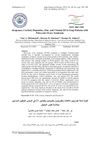TLDR Women with PCOS have higher hair cortisol levels, which are linked to worse metabolic and inflammatory conditions.
The study investigated the activation of the adrenal axis in 44 women with polycystic ovary syndrome (PCOS) aged 18-34 years by measuring hair cortisol levels and its impact on metabolic, inflammatory, and androgen parameters compared to 49 healthy women aged 19-35 years. Hair cortisol levels were significantly higher in PCOS patients (130 pg/mg) than in controls (63 pg/mg, p < 0.001). PCOS patients were further categorized based on hair cortisol levels into a normal group and a high group (above 128 pg/mg). In the high cortisol group, total serum testosterone (TT) and bioavailable testosterone (bioT) showed significant correlations with various metabolic and inflammatory markers (p < 0.05). The study concluded that high hair cortisol levels in PCOS patients indicate hyperactivation of the hypothalamic-pituitary-adrenal (HPA) axis, and these elevated levels are associated with adverse metabolic and inflammatory profiles only in the PCOS group with high hair cortisol.
 85 citations
,
August 2018 in “Psychological Medicine”
85 citations
,
August 2018 in “Psychological Medicine” Women with PCOS are more likely to suffer from depression, anxiety, and stress.
 1540 citations
,
October 2008 in “Fertility and Sterility”
1540 citations
,
October 2008 in “Fertility and Sterility” The report concludes that PCOS is mainly a condition of excess male hormones and its definition may change as new information is discovered.
567 citations
,
October 2007 in “Clinical and investigative medicine” Hair cortisol can be used to measure long-term stress exposure.
 February 2025 in “Iraqi Journal of Science”
February 2025 in “Iraqi Journal of Science” PCOS patients have higher LDH and lower cortisol, dopamine, zinc, and vitamin D3, which may contribute to their symptoms and obesity.
 8 citations
,
February 2010 in “Journal für Kardiologie (Krause & Pachernegg GmbH)”
8 citations
,
February 2010 in “Journal für Kardiologie (Krause & Pachernegg GmbH)” A new system helps better diagnose and treat female androgenization conditions like PCOS.
 222 citations
,
January 2014 in “International journal of reproductive medicine”
222 citations
,
January 2014 in “International journal of reproductive medicine” Insulin resistance and obesity are key factors in the development and worsening of polycystic ovary syndrome, and lifestyle changes are important for managing it.
 14 citations
,
January 2018 in “Advances in Clinical Chemistry”
14 citations
,
January 2018 in “Advances in Clinical Chemistry” The document concludes that hormonal biomarkers are key for diagnosing hyperandrogenemia in women and hypogonadism in men.
 76 citations
,
November 2009 in “Medical Clinics of North America”
76 citations
,
November 2009 in “Medical Clinics of North America” Hormones, especially androgens, play a key role in acne, which can be a symptom of systemic diseases like PCOS and may require targeted treatment.







